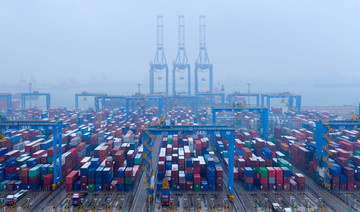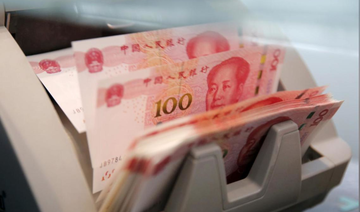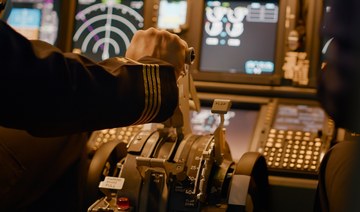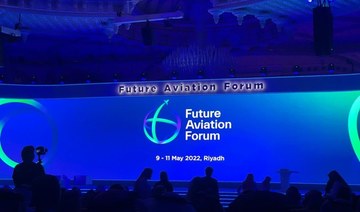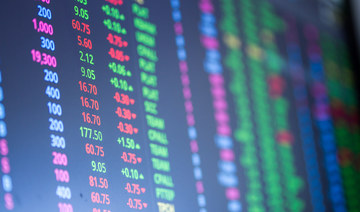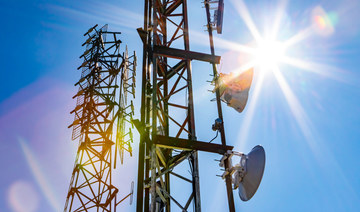BEIJING: China’s premier warned Tuesday that the country faces a “tough struggle” as he unveiled tax cuts and other measures to prop up an economy expected to slow further this year.
Premier Li Keqiang told the opening session of China’s annual National People’s Congress that the government is targeting growth of 6.0 to 6.5 percent this year for the world’s second-largest economy, lowering its range from 2018.
The slowdown and trade war have become major challenges for President Xi Jinping, one year after the NPC boosted his status as the country’s most powerful leader since Mao Zedong by abolishing term limits and etching his name into China’s constitution.
Nearly 3,000 delegates from across the country gathered under smoggy skies and tight security for the two-week session, with legislation aimed at improving conditions for foreign investors topping the agenda.
“In pursuing development this year, we will face a graver and more complicated environment as well as risks and challenges ... that are greater in number and size,” Li said in his speech.
“We must be fully prepared for a tough struggle,” he said.
The government had set a target of around 6.5 percent in 2018 and eventually recorded official growth of 6.6 percent — the slowest pace in nearly three decades.
Three-quarters of provinces have already lowered their annual growth targets this year.
“We have made a moderate adjustment to our projection on the basis of a thorough assessment of destabilizing factors and uncertainties affecting the economic performance,” Li said.
To combat slowing growth, policy-makers have said they will lower taxes, reduce fees, and streamline red tape.
China will cut company taxes and employer social insurance contributions paid on behalf of workers by nearly 2 trillion yuan ($298 billion), Li said.
The value-added tax for manufacturers will be lowered to 13 percent from 16 percent and drop one percent for transportation and construction industries.
Beijing will also pick up spending, with China’s targeted fiscal deficit set to increase to 2.8 percent of GDP, from 2.6 percent last year.
Fiscal policy will be “proactive,” while monetary policy will remain “prudent,” Li said, outlining cuts to the reserve ratios at medium and small banks to unleash more funds into the economy.
To combat problems facing small business, Beijing will raise the VAT threshold to 100,000 yuan ($15,000) in monthly sales, from 30,000 yuan ($4,500) and direct large state banks to lend 30 percent more to small firms this year.
Beijing is determined to achieve above six percent growth for the next two years to “meet its promise” of doubling GDP for the decade ending 2020, said Lu Ting, an analyst at Nomura bank.
As the economy slows, the government has unveiled a military budget increase of 7.5 percent to 1.2 trillion yuan ($177.6 billion), lower than last year’s 8.1 percent hike.
Recent economic data point to the difficulties China faces, with growth in the last three months of 2018 clocking in at 6.4 percent.
In January, an important barometer of prices in the country’s industrial sector eased further, nearing contraction territory and potentially denting corporate profits. China’s imports also fell at the start of the year.
Manufacturing activity has shrunk for three straight months, recording its worst performance in three years in February.
But the country’s roller-coaster stock market has recently turned into a bright spot, hitting its highest point in more than eight months on Monday amid renewed optimism about a US trade deal.
Relations with the United States deteriorated sharply last year after President Donald Trump hit roughly half of Chinese imports with new tariffs in an attempt to force trade concessions.
But Trump has voiced confidence that he could soon sign a deal with Xi.
We will “continue to promote China-US trade negotiations,” Li said, and will settle “trade disputes through discussions as equals.”
Enforcement of any agreement with the US has emerged as a potential sticking point.
“We faithfully honor our commitments,” Li said.
Li said they will not jolt growth with large-scale stimulus like during the financial crisis, instead laying out policies to improve the business environment.
The legislature will next week pass a new law regulating foreign investment and barring the forced transfer of technology by foreign firms to Chinese joint venture partners, in a move that could help ease US trade tensions.
Beijing will “create a fair and impartial market environment where Chinese and foreign companies are treated as equals and engage in fair competition,” Li said.
China cuts taxes, sees ‘tough struggle’ as growth slows
China cuts taxes, sees ‘tough struggle’ as growth slows
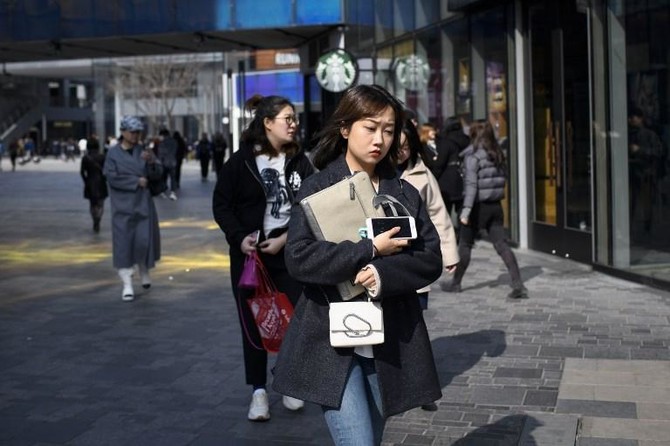
- The government is targeting growth of 6.0 to 6.5 percent this year for the world’s second-largest economy, lowering its range from 2018
- Manufacturing activity has shrunk for three straight months, recording its worst performance in three years in February
Saudi Arabia to reveal $100bn in investment opportunities at aviation forum

- Minister for Transport and Logistics Services Saleh-Al-Jasser: Saudi Arabia is presenting aviation investment opportunities that are unmatched globally
- Minister for Investment Khalid Al-Falih: Aviation is a key investment sector and enabler of the Kingdom’s broader economic transformation
RIYADH: The world’s largest aviation investors will descend on Riyadh later this month for the Future Aviation Forum, where Saudi Arabia will unveil more than $100 billion in investment opportunities to enable its ambitious Saudi Aviation Strategy.
The forum’s investment showcase will highlight projects and incentives to attract investment into the Kingdom’s booming aviation sector, including airports, airlines, ground services, cargo and logistics.
In the $100 billion in investment opportunities, airports account for more than $50 billion, new aircraft orders about $40 billion, while the remaining $10 billion is earmarked for other projects, including $5 billion in special logistics areas around the main airports in Riyadh, Jeddah, and Dammam.
Minister for Transport and Logistics Services Saleh-Al-Jasser, who will open FAF24, said: “Saudi Arabia is presenting aviation investment opportunities that are unmatched globally, as the Saudi Aviation Strategy triples passenger numbers, connects to more than 250 destinations and handles 330 million passengers and 4.5 million tonnes of cargo by 2030.”
Minister for Investment Khalid Al-Falih, who will open the investment showcase, added: “Saudi Arabia is the world’s new investment hub, targeting $3.3 trillion in investment by 2030. Aviation is a key investment sector and enabler of the Kingdom’s broader economic transformation. The aviation investment showcase will provide investors with unparalleled access to participate in the Kingdom’s transformation.”
The showcase will include investor briefings, meetings and panels on major projects including the six-runway King Salman International Airport in Riyadh and public private partnerships for Abha, Taif, Hail and Qassim international airports. The showcase will also feature opportunities in cargo and logistics, advanced air mobility and business aviation. Aviation suppliers will be briefed on expansion plans for new airline Riyadh Air, as well as leading regional airlines including Saudia, Flynas and Flyadeal.
Global executives from Boeing, Airbus, Commercial Aircraft Corporation of China, and Embraer will attend the event, alongside investors and representatives from airlines, airports, cargo, logistics and aviation services companies. Speakers include Saudi ministers as well as Saudi and global aviation and investment CEOs.
The Future Aviation Forum runs from May 20-22 in Riyadh. For more information, visit www.futureaviationforum.com
NEOM to build Jaumur marina on the Gulf of Aqaba
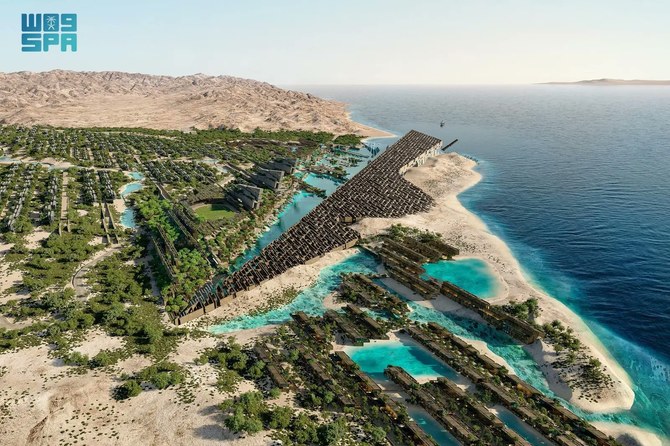
- Jaumur will be an exclusive residential community planned around an inspiring marina for more than 6,000 residents
- The marina promenade will be a place alive with entertainment, leisure and cultural experiences, hosting year-round arts events and performance programs
RIYADH: NEOM has announced that it will build a new marina and community on the Gulf of Aqaba called Jaumur.
The board of directors of NEOM said that Jaumur will be designed to serve the highest standards of future livability and active lifestyle. The new addition promises a unique blend of experiences on land and sea, complementing NEOM’s evolving regional development in northwest Saudi Arabia.
Jaumur will be an exclusive residential community planned around an inspiring marina for more than 6,000 residents. Embedded into the varied topography of the Gulf of Aqaba coast, it will feature 500 marina apartments and nearly 700 luxury villas, offering waterfront access and private mooring. Two distinctive destination hotels in Jaumur will offer 350 luxurious rooms and suites, inviting guests to enjoy the breathtaking views and embrace all aspects of modern coastal hospitality and sporting activities.
The marina will be the focal point of the development, the beating heart around which the community of Jaumur will thrive. A 1.5 km aerofoil rises above the largest of the yacht berths, providing year-round protection for yacht owners and a haven for the marina’s residents and guests. The aerofoil incorporates a gravity-defying cantilever to form a stunning entrance to the marina, welcoming the world’s largest superyachts.
The marina promenade will be a place alive with entertainment, leisure and cultural experiences, hosting year-round arts events and performance programs, complemented by signature retail outlets and world-class dining options.
Jaumur’s commitment to innovation and learning is embodied in the development’s state-of-the-art deep-sea research center and top-tier international boarding school. The research institute is dedicated to deep-sea exploration, welcoming established experts and ambitious pioneers to champion marine discovery, knowledge and conservation and establish NEOM as a world-leading center for oceanographic research.
The international boarding school will prepare students for global achievement through an exclusive and progressive education delivered by a diverse international faculty of experts and innovators.
Jaumur’s unique architectural design integrates water where golden sands meet the deep blue of the Gulf of Aqaba. It is a luxury destination to visit, explore, live and prosper: an opportunity to become part of a dynamic community.
Jaumur follows the recent announcements of Leyja, Epicon, Siranna, Utamo, Norlana, Aquellum, Zardun, Xaynor, Elanan, Gidori and Treyam as sustainable tourism destinations on the Gulf of Aqaba, all woven together by NEOM’s commitment to sustainable progress.
Closing Bell: TASI edges up to close at 12,460 points

RIYADH: Saudi Arabia’s Tadawul All Share Index climbed on Wednesday, gaining 102.12 points, or 0.83 percent, to close at 12,460.11.
The total trading turnover of the benchmark index was SR8.189 billion ($2.18 billion), as 138 of the listed stocks advanced while 81 retreated.
Similarly, the MSCI Tadawul Index increased by 9.75 points, or 0.63 percent, to close at 1,557.46.
The Kingdom’s parallel market Nomu also climbed by 144.95 points, or 0.54 percent, to close at 26,886.59. This comes as 32 of the listed stocks advanced while as many as 35 retreated.
The best-performing stock of the day was Acwa Power Co., whose share price surged by 9.7 percent to SR438.80.
Other top performers include Alkhaleej Training and Education Co. and the Mediterranean and Gulf Insurance and Reinsurance Co., whose share prices soared 8.92 percent and 8.09 percent to SR37.25 and SR34.75, respectively.
Additional top performers include Al-Baha Investment and Development Co. and Malath Cooperative Insurance Co.
The worst performer was Nahdi Medical Co., whose share price dropped by 2.48 percent to SR133.60.
Other poor performers were the Co. for Cooperative Insurance as well as Jabal Omar Development Co., whose share prices dropped by 2.42 percent and 2.32 percent to stand at SR161 and SR27.40, respectively.
Additional poor performers include United Cooperative Assurance Co. and AlSaif Stores for Development and Investment Co.
On the announcements front, Al Rajhi Bank announced its intention to issue US-denominated additional tier-1 capital sukuk under its international additional tier-1 capital sukuk program established on April 18 following the board of directors’ decision on March 25.
The bank informed Tadawul that the value and terms of the sukuk offering would be decided based on current market conditions.
The sukuk will be issued through a special-purpose vehicle and will be accessible to qualified investors, both domestically and internationally.
The bank appointed Al Rajhi Capital, Citigroup Global Markets Ltd, Dubai Islamic Bank, and Emirates NBD, as well as Goldman Sachs International, HSBC, and Standard Chartered Bank, as joint lead managers and bookrunners for the potential offering.
Nahdi Medical Co. announced its results for interim financial results for the period ending on March 31, with revenues surging by 7.24 percent to reach SR2.257 billion, compared to SR2.105 billion in 2023.
The increase was primarily driven by a strong performance in the core pharma segment and a solid recovery in front shop segment led by the beauty categories.
However, the company’s net profits decreased in the first quarter of this year to SR232.9 million, marking a 4.67 percent decline compared to the same quarter in 2023.
Saudi Telecom Co. also announced its financial results for the same period with earnings increasing 5.07 percent compared to the same quarter last year, reaching SR19.1 billion.
Saudi Real Estate Co. also announced its financial results for the same period, with revenues surging by 8.8 percent to reach SR427.6 million, compared to SR393 million in 2023.
The revenue growth was mainly attributed to the increase in stc Saudi Arabia earnings by 1.2 percent, driven by the rise in commercial unit revenues by 6.7 percent and carriers and wholesale unit incomes by 5.7 percent, which offset the decline in business unit revenues.
Furthermore, stc’s subsidiaries’ gains also increased by 13 percent.
Halwani Bros. Co.’s earnings increased by 5.93 percent to SR270.36 billion compared to SR255.22 billion in its interim financial results, which ended March 31.
The reason for the increase in sales during the current quarter compared to the same period of the previous year is due to a rise in the company’s transactions in the Kingdom and its subsidiary in Egypt.
Saudi Arabia achieves highest evaluation level in UN’s Competition Law Systems Report

RIYADH: Saudi Arabia has received global recognition from a UN commission for its robust legal framework and “very strong” competition law.
The Kingdom attained the highest evaluation level in the Competition Law Systems Report for 2023, issued by the UN Economic and Social Commission for Western Asia, surpassing the “developed” level achieved in 2020, according to the Saudi Press Agency.
The Competition Law Index measures the strictness of regulations and is categorized according to the maturity of eight key criteria.
The Kingdom achieved a perfect score of seven in the index concerning regulatory frameworks for economic concentration operations.
Saad Al-Masoud, the spokesperson for the General Authority for Competition, affirmed that this advancement reflects the support GAC receives from the wise leadership to achieve the goals of Vision 2030 programs.
He added that these objectives aim to improve a sustainable business atmosphere, foster economic growth, and advance consumer welfare.
Al-Masoud further noted that this achievement is the result of significant developments in several areas, including laws combating monopolistic practices and anti-competitive agreements, as well as his authority’s efforts to review economic concentrations.
He also said that several additional factors have contributed to upholding the competitive landscape of the business sector, ensuring fairness, transparency, and adherence to reasonable competition regulations.
An initial competition system was established in Saudi Arabia in 2004, and in October 2017 the Kingdom’s Council of Ministers endorsed the change of the name to the GAC and a new organizational structure.
The authority was also made a financially and administratively independent entity, and in March 2019, another royal decree was issued approving the updated competition system.
Since its inception 20 years ago, GAC has imposed fines totaling nearly SR1 billion ($270 million) on around 252 companies found to be violating its regulations, according to a recent interview Al-Masoud conducted with Arab News.
As a prominent regulatory body, it aims to safeguard the integrity of market mechanisms while fostering innovation and diversity in products and services.
stc Bank set to launch later this year, says group CEO
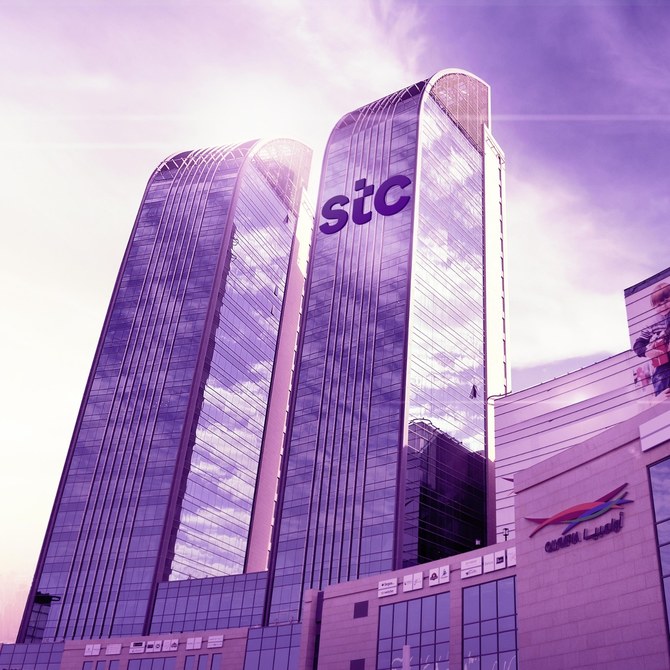
RIYADH: Saudi telecom giant stc Group has obtained official approval for the soft launch of its new banking sector subsidiary, aiming to provide Shariah-compliant fintech solutions.
The Saudi Central Bank has given the green light for the beta launch of stc Bank, with a full rollout to all customers anticipated later this year, revealed the company's CEO, Olayan Al-Wetaid, while announcing the financial results of the first quarter.
The new entity will offer banking services and financial solutions compliant with Islamic Shariah, prioritizing high security and customer protection through advanced fintech. This aligns with the ambitious goals of the Kingdom’s Vision 2030 for a prosperous diversified economy.
In its financial results announcement for the period ending March 31, the CEO explained that stc Group has strengthened its position in the telecommunications sector through a strategic partnership with the Public Investment Fund.
Earlier in April, the two entities finalized agreements for PIF to acquire a 51 percent stake in the Telecommunications Towers Co., also known as Tawal, valuing the company at SR21.94 billion ($5.8 billion).
This transaction is part of a broader merger with Golden Lattice Investment Co. to form a new entity that aims to lead the national telecommunications infrastructure, with stc Group retaining a 43.06 percent stake.
These developments are part of stc’s DARE 2.0 strategy, which focuses on unconventional growth paths and leading digital transformation in the region, Al-Wetaid stated.
The strategy has already yielded significant results, with stc’s network experiencing its highest volume of voice calls during the recent Ramadan, a 35 percent increase compared to the previous year, supported by modern digital voice technologies.
Further embodying its growth strategy, stc Group has engaged in numerous strategic partnerships and agreements, notably at the LEAP 2024 conference with global tech giants such as Huawei, Ericsson, and Samsung.
These collaborations are designed to enhance innovation and speed up digital transformation across the region.
Additionally, the group’s subsidiary, Solutions, signed a memorandum of understanding with the French Devoteam Group in February to explore IT investment opportunities globally, following Solutions’ acquisition of a 40 percent stake in Devoteam Middle East.
In its financial report, stc Group highlighted a notable growth in revenues for the first quarter of 2024, which increased by 7.76 percent compared to the previous quarter and by 5.07 percent compared to the same quarter last year, totaling SR19.1 billion.
This revenue growth was primarily driven by a 1.2 percent increase in stc Saudi Arabia’s revenues, supported by a 6.7 percent rise in commercial unit revenues and a 5.7 percent increase in carriers and wholesale unit revenues, despite a decline in business unit revenues.
Additionally, revenues from stc’s subsidiaries saw a significant rise of 13 percent.
The company also reported growth in gross profit, which rose by 5.13 percent compared to the previous quarter and by 1.65 percent compared to the same quarter last year, reaching SR9.3 billion.
Earnings before interest, taxes, zakat, depreciation, and amortization similarly showed a robust increase, rising by 16.3 percent compared to the previous quarter and by 2.07 percent compared to the same period last year, reaching SR6.4 billion.
Notably, net profit for the quarter surged by 44.50 percent compared to the previous quarter and increased by 5.69 percent compared to the same quarter last year, totaling SR3.2 billion.


